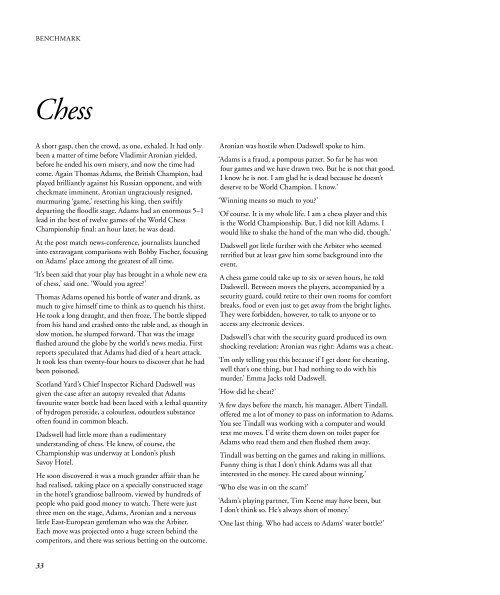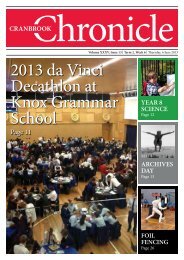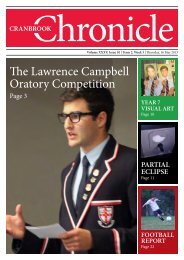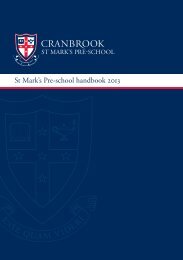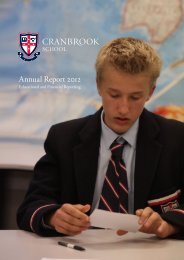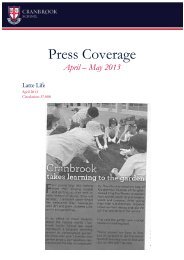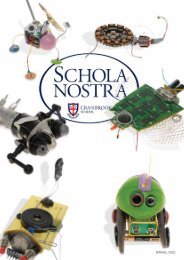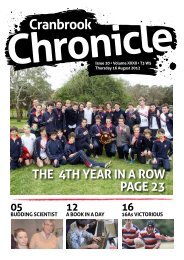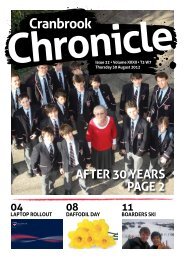Literary Journal Issue#5 2011 - Cranbrook School
Literary Journal Issue#5 2011 - Cranbrook School
Literary Journal Issue#5 2011 - Cranbrook School
You also want an ePaper? Increase the reach of your titles
YUMPU automatically turns print PDFs into web optimized ePapers that Google loves.
BENCHMARK<br />
Chess<br />
A short gasp, then the crowd, as one, exhaled. It had only<br />
been a matter of time before Vladimir Aronian yielded,<br />
before he ended his own misery, and now the time had<br />
come. Again Thomas Adams, the British Champion, had<br />
played brilliantly against his Russian opponent, and with<br />
checkmate imminent, Aronian ungraciously resigned,<br />
murmuring ‘game,’ resetting his king, then swiftly<br />
departing the floodlit stage. Adams had an enormous 5–1<br />
lead in the best of twelve games of the World Chess<br />
Championship final: an hour later, he was dead.<br />
At the post match news-conference, journalists launched<br />
into extravagant comparisons with Bobby Fischer, focusing<br />
on Adams’ place among the greatest of all time.<br />
‘It’s been said that your play has brought in a whole new era<br />
of chess,’ said one. ‘Would you agree?’<br />
Thomas Adams opened his bottle of water and drank, as<br />
much to give himself time to think as to quench his thirst.<br />
He took a long draught, and then froze. The bottle slipped<br />
from his hand and crashed onto the table and, as though in<br />
slow motion, he slumped forward. That was the image<br />
flashed around the globe by the world’s news media. First<br />
reports speculated that Adams had died of a heart attack.<br />
It took less than twenty-four hours to discover that he had<br />
been poisoned.<br />
Scotland Yard’s Chief Inspector Richard Dadswell was<br />
given the case after an autopsy revealed that Adams<br />
favourite water bottle had been laced with a lethal quantity<br />
of hydrogen peroxide, a colourless, odourless substance<br />
often found in common bleach.<br />
Dadswell had little more than a rudimentary<br />
understanding of chess. He knew, of course, the<br />
Championship was underway at London’s plush<br />
Savoy Hotel.<br />
He soon discovered it was a much grander affair than he<br />
had realised, taking place on a specially constructed stage<br />
in the hotel’s grandiose ballroom, viewed by hundreds of<br />
people who paid good money to watch. There were just<br />
three men on the stage, Adams, Aronian and a nervous<br />
little East-European gentleman who was the Arbiter.<br />
Each move was projected onto a huge screen behind the<br />
competitors, and there was serious betting on the outcome.<br />
33<br />
Aronian was hostile when Dadswell spoke to him.<br />
‘Adams is a fraud, a pompous patzer. So far he has won<br />
four games and we have drawn two. But he is not that good.<br />
I know he is not. I am glad he is dead because he doesn’t<br />
deserve to be World Champion. I know.’<br />
‘Winning means so much to you?’<br />
‘Of course. It is my whole life. I am a chess player and this<br />
is the World Championship. But, I did not kill Adams. I<br />
would like to shake the hand of the man who did, though.’<br />
Dadswell got little further with the Arbiter who seemed<br />
terrified but at least gave him some background into the<br />
event.<br />
A chess game could take up to six or seven hours, he told<br />
Dadswell. Between moves the players, accompanied by a<br />
security guard, could retire to their own rooms for comfort<br />
breaks, food or even just to get away from the bright lights.<br />
They were forbidden, however, to talk to anyone or to<br />
access any electronic devices.<br />
Dadswell’s chat with the security guard produced its own<br />
shocking revelation: Aronian was right: Adams was a cheat.<br />
‘I’m only telling you this because if I get done for cheating,<br />
well that’s one thing, but I had nothing to do with his<br />
murder,’ Emma Jacks told Dadswell.<br />
‘How did he cheat?’<br />
‘A few days before the match, his manager, Albert Tindall,<br />
offered me a lot of money to pass on information to Adams.<br />
You see Tindall was working with a computer and would<br />
text me moves. I’d write them down on toilet paper for<br />
Adams who read them and then flushed them away.<br />
Tindall was betting on the games and raking in millions.<br />
Funny thing is that I don’t think Adams was all that<br />
interested in the money. He cared about winning.’<br />
‘Who else was in on the scam?’<br />
‘Adam’s playing partner, Tim Keene may have been, but<br />
I don’t think so. He’s always short of money.’<br />
‘One last thing. Who had access to Adams’ water bottle?’


